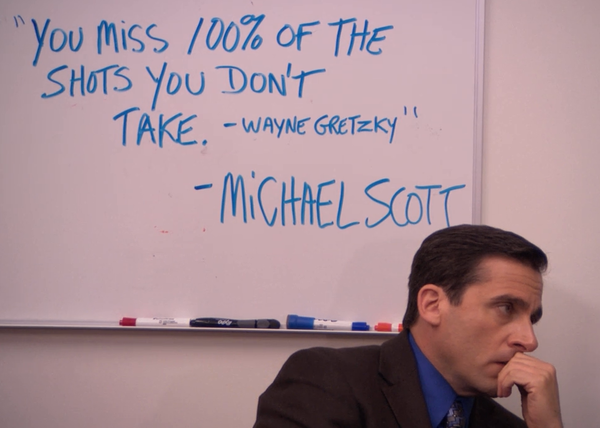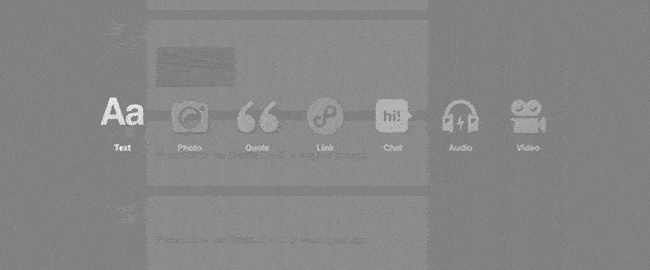
I think about this whiteboard a lot.
The main character of a popular sitcom once wrote on a whiteboard, “‘You miss 100% of the shots you don’t take. – Wayne Gretzky’ — Michael Scott.”
And in a lot of ways, I feel like the initial concept of Tumblr doing paid posts at this juncture is kind of like that quote, as written. The problem is not necessarily with the quote itself. It’s a fair point. But the problem is with execution (somewhat) and timing (mostly). There’s a difference between saying the right things, saying them at the right time, and being the right person to say them.
And I think the problem with Tumblr, now owned by Automattic, is that they figured out the right move, but unfortunately, they may not be the correct vessels for that move at this specific time. Communities are culture, and Tumblr’s community is so used to things working in a specific way that they will not show any flexibility to something that, honestly, could have worked at another point in its history.
It could have worked when I was posting on Tumblr frequently, when there was a real groundswell of talented people doing great things with their Tumblr curation, artistry, and writing skills, and (importantly) the mainstream media was noticing this. At that time, there was genuine interest in something like that happening in the space that could have given creators some form of access to financial support.
But that never happened—and it led some Tumblr users down some rough paths. There is an infamous story of a popular Tumblr user, Jess Miller, building a lot of success on the platform with their username pizza as a teenager, but failing to find a way to monetize their platform, and ultimately, using an underhanded tactic (selling sketchy diet pills) to make some real money from their reach. They got booted from the platform. Imagine if Tumblr was releasing something like Post+ at a time when someone like Miller was in a position to benefit from it.

(Taylor Friehl/Unsplash)
Now, I have somewhat of an inside interest in this discussion, as I had a Tumblr with 160,000 followers at the time I shut it down. I had the level of scale and reach to realistically make something like Tumblr Post+ work. Technically, I still do if I ever decide to go back to Tumblr—while there has been some natural decline over time due to the fact that I haven’t posted very much since late 2014, I still have 148,000 followers. And some of those people are still around; I posted a GIF on it recently and it has more than 400 likes and reblogs as I write this.
But the problem is, the release of this tool comes at a time when there are lots of options to turn on the cash register. Patreon has existed for years. People have figured out how to use Substack to make a go of it. Heck, the service you’re reading this on, Revue, makes it a one-click process to gate my content for my nearly 300 subscribers to this newsletter behind the paywall. Yes, I live in a world where, given the choice between 148,000 followers and 280-something, I chose the three-digit number.
I think Automattic and Tumblr are trying to do the best they can with a not particularly well-suited deck of cards. They have a community that is well-established but needs a realistic monetization model beyond advertising to survive beyond simply being a charity mission. The users that have stuck with it have come to treasure the relatively non-commercial nature of the platform.
(And the response from some of those users has been unbelievably over the top.)
And another factor is that Tumblr’s design would be basically perfect as a web interface for Substack-style newsletters. Basically every element is there. Maybe they just need to make a Tumblr for newsletters and let the meme machine live on its own.
But ultimately, the community is going to decide where the puck goes. And the Tumblr community circa 2021, having dealt with a lot of challenges from Tumblr leadership over the years, is not the Tumblr community circa 2011, when there was a lot of hope and optimism that this could be something awesome. It did turn into something awesome—but it’s a much more inflexible awesome, because now people are worried about any change that ruins a good thing.
And that’s why a monetization strategy that looks good on paper may struggle to win over the many people still there.
P.S.: I tweeted this point directly to the relevant parties, but I wasn’t a big fan of the erasure of earlier Tumblr users in this Wall Street Journal article—particularly the suggestion they didn’t care about monetization (we did). Those early users made you relevant; don’t forget that.
Update: I highly recommend this piece from TechCrunch explaining why this move blew up in Tumblr’s face. It’s pretty damning from a leadership perspective.
Time limit given ⏲: 30 minutes
Time left on clock ⏲: 3 minutes, 19 seconds



